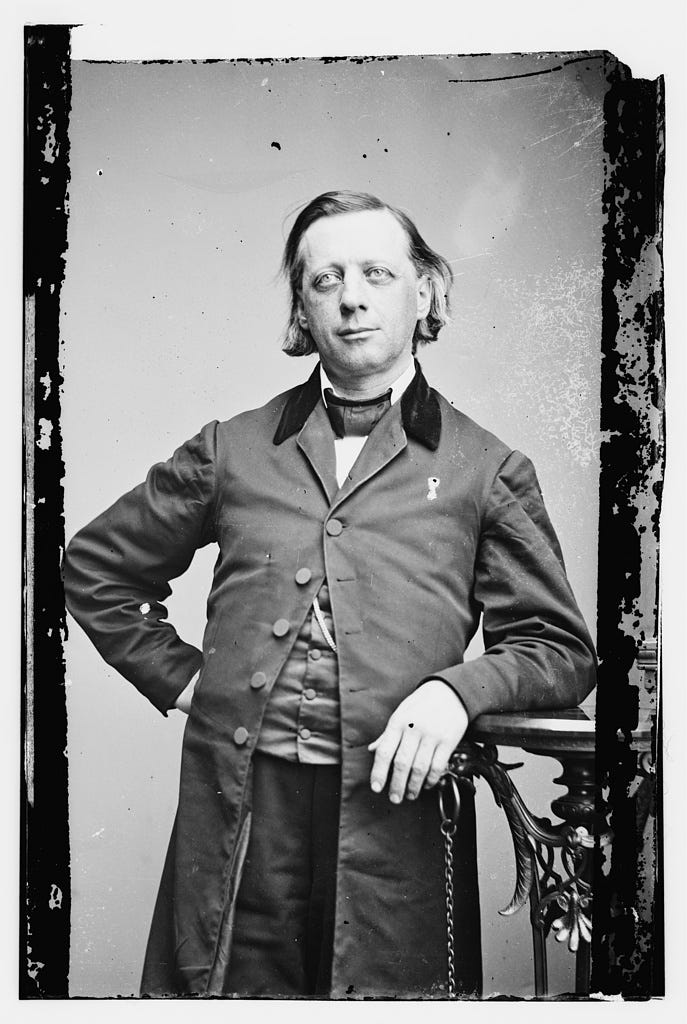Victoria’s gift for speaking is a revelation to her; nothing in her previous experience caused her to think she would have such power over audiences. Her gift for listening, by contrast, is something she has always recognized. Listening was a large part of the confidence games she played on clients for her father; as the bereaved poured out their sorrows to her, she intuited what to answer to make them think their kin were calling from beyond the grave. She remains a good listener even as she grows famous, and people tell her things—very personal things—they don’t share with others.
People tell her about Henry Ward Beecher, for example. She knows the Plymouth Church pastor by reputation but thinks little about him until the day she visits Congress. She is preparing her remarks when someone in the room suggests that Isabella Beecher Hooker, one of the suffragist leaders, might snub Victoria on account of her questionable antecedents. Victoria recalls overhearing the surmises, and she relates the response: “Instantly a gentlemen, a stranger to me, stepped forward and said: ‘It would ill become these women, especially a Beecher, to talk of antecedents or to cast any smirch upon Mrs. Woodhull, for I am reliably informed that Henry Ward Beecher preaches to at least twenty of his mistresses every Sunday.’”
Victoria ignores the remark, as she is trying to focus on the statement she is about to make to the members of Congress. “But it afterward forcibly recurred to me with the thought also that it was strange that such a remark, made in such a presence, had seemed to have a subduing effect instead of arousing indignation,” she recalls. And far from being snubbed by Isabella Beecher Hooker, Victoria finds her and her coterie to be as kind as anyone could ask. “The women who were there could not have treated me better than they did. Whether this strange remark had any influence in overcoming their objections to me, I do not know; but it is certain they were not set against me by it, and all of them, Mrs. Hooker included, subsequently professed the warmest friendship for me.”
Victoria learns more about Henry Beecher from Pauline Wright Davis, a close friend of Elizabeth Tilton, whom Henry Beecher has called upon so assiduously while her husband, Theodore Tilton, travels the country giving lectures. Mrs. Davis explains that one day when she was visiting the Tilton home, Elizabeth burst into tears over Beecher. Lib said that she and Beecher have been lovers, and that she has recently miscarried a child probably fathered by Beecher. Davis repeats the tale to Victoria, adding, “I came away from that house, my soul bowed down with grief at the heart-broken condition of that poor woman, and I felt that I ought not to leave Brooklyn until I had stripped the mask from that infamous, hypocritical scoundrel, Beecher.” Davis, in the event, says nothing publicly, but encourages Victoria to do so. “I believe you are raised up of God to do a wonderful work, and I believe that you will unmask the hypocrisy of a class that none others dare touch,” she tells Victoria. “The more I think of that mass of Beecher corruption, the more I desire its opening.”
Before Victoria can decide how to respond to Paula Davis’s story, she hears of Henry Beecher’s adulteries from yet another source. Elizabeth Cady Stanton has learned of Beecher’s affair with Lib Tilton from Theodore Tilton, to whom Lib confessed it. Theodore Tilton was very upset, feeling betrayed by both his wife and Beecher, the man he admired above all others. As Stanton tells Victoria: “I never saw such a manifestation of mental agony. He raved and tore his hair and seemed upon the very verge of insanity. ‘Oh!’ said he, ‘that that damned lecherous scoundrel should have defiled my bed for ten years, and at the same time professed to be my best friend! Had he come like a man to me and confessed his guilt, I could perhaps have endured it, but to have him creep like a snake into my house leaving his pollution behind him, and I so blind not to see, and esteeming him all the while as a saint—oh! it is too much. And when I think how for years she, upon whom I had bestowed all my heart’s love, could have lied and deceived me so, I lose all faith in humanity. I do not believe there is any honor, any truth left in anybody in the world.’”



